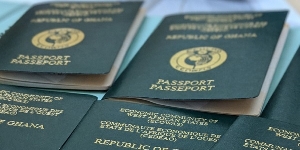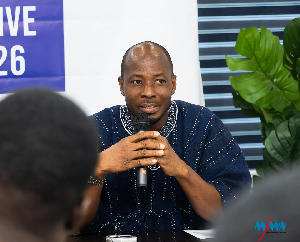TROUBLE AT WAMI
.Directors Fight Over Millions As They Accuse Their Boss Of Plagiarism
Directors of the West African Monetary Institute are at one another’s throat over the proceeds of a book supposed to have been put together courtesy the resources of the entity.
Some former and current directors have accused the Director-General, Dr. Temitope Waheed Oshikoya of greed and plagiarism when he decided to publish the book as his own handiwork.
The book, “Monetary and Financial Integration in West Africa” is being sold across the world to post graduates and researchers in development economics, as well as policy makers, monetary authorities and development practitioners at a cover price of £85.00.
Taking his greed to another level, Dr Temitope using his usual intimidatory tactics coerced WAMI through his publishers, Routledge of the Taylor and Francis Group of the United Kingdom (UK) to purchase 50 copies at the cost of £2,975.00.
Capitaline cum Ghana Daily interactions with a host of WAMI directors both past and present, who prepared these research works say there was no time that they were informed by the Director-General that the research was going to be published and sold worldwide.
‘We did not even have a meeting by which the idea was discussed and approved that the research was going to be published by a publishing company for which WAMI will earn some royalties,’ an angry director who pleaded on condition of anonymity said.
Another director, a past one whined: “This research was done during normal working hours, with WAMI logistics (cars and fuel) and stationary, travelling allowances catered to gather data came from WAMI coffers”.
The directors are further angered with the discovery that there is nowhere in the book that their contributions were acknowledged. Only Dr. Temitope Oshikoya was qualified by the book as author and editor.
The management of WAMI has refused comment on the plagiarism charges and other corruption issues when contacted by the editors of these two papers.
They have even refused to reply a request for interview letter sent to them two months.
“Monetary and Financial Integration in West Africa” is the first book on monetary and financial integration in The Gambia, Ghana, Guinea, Nigeria and Sierra Leone.
According to experts and book reviewers, the publication is extremely well researched with details on virtually all aspects of economic integration in the West African sub-region with issues ranging from the institutional details of integration to trade and financial market integration. Other key themes the book covers are progress on convergence of macroeconomic fundamentals and the required payment system infrastructure in West Africa.
The voluminous research, a collection of valuable contribution and an excellent companion book for monetary economics or international economics classes as well as African development literature, was prepared by entire staff of WAMI with the institute’s financial and other resources.
The charge of plagiarism arises from the fact that Routledge published those research papers with the connivance of Dr Temitope for monetary gains without official authorization from WAMI.
Before the official launch of the book on July 21, 2011, a war of words ensured between the top echelons of WAMI when a pro forma invoice of the book from Taylor and Francis asked WAMI to purchase 50 copies costing £2,975.00.
When the invoice reached the desk of the Internal Auditor and the Director of Finance, Mr. Adeniyi Karunwi to pass it for payment to be effected, he minuted a grave concern to the Director of Finance.
He stated, “Please, 1.We cannot pay based on a pro forma invoice. 2. The invoice is issued in the name of Mr. Adeniyi Karunwi and not in the name of WAMI. It looks to be a private invoice. 3. Staff of WAMI publishing a research work in a book and selling it to WAMI may be viewed as conflict of interest.”
The finance director also wrote to the Director General: “I think that an invoice in the name of WAMI (addressed to WAMI) is adequate for the purchase so long as management has authorized the purchase.”
The Director-General fired back with anger: “P/s advice the internal auditor to ask for clarifications if he does not know or have the full details of a transaction. What is ‘conflict of interest’ in a publication authored by WAMI staff on a very topical issue relevant to WAMI’s mandate on which WAMI is to collect royalties thereon? He apparently does not know the history behind the publication.”
The Institute is currently enmeshed in corruption, maladministration and outright theft with the issuing of the West African currency, ECO, postponed three times.
At WAMI, contracts are awarded to friends and cronies without a competitive tender bidding and good governance standards are clearly missing at the Institute.
Stay tuned as we expose more rot and corruption at WAMI.
General News of Tuesday, 4 October 2011
Source: Ghana Daily












